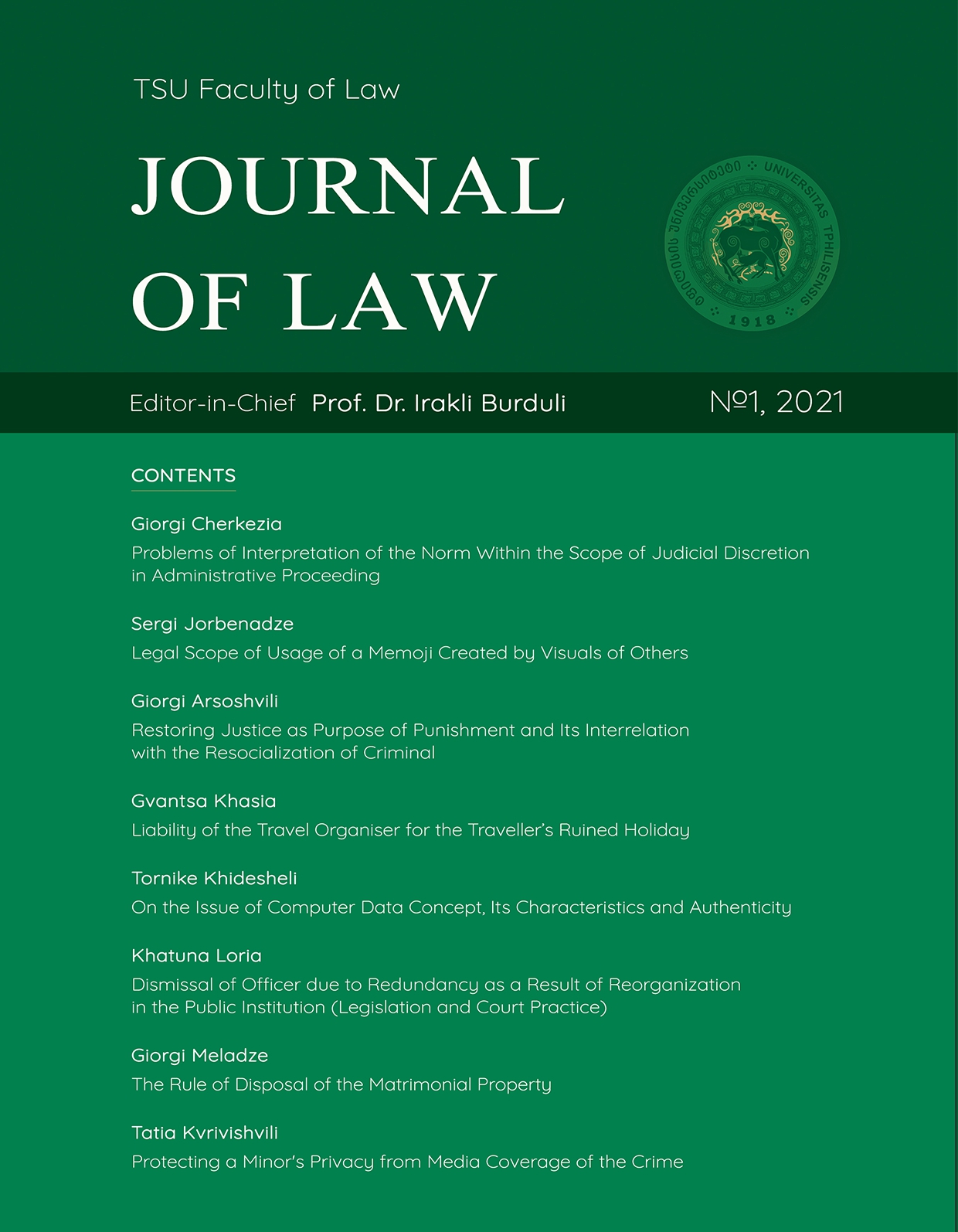On the Issue of Computer Data Concept, its Characteristics, and Authenticity
DOI:
https://doi.org/10.60131/jlaw.1.2021.3355Keywords:
Computer data, Computer system, Digital evidence, Electronic evidence, Authentication of computer data.Abstract
This letter addresses a topical issue such as computer data and its use in criminal proceedings. Given, which is completely different from the traditional evidence and due to its specific and technical characteristics has become a significant challenge for the legal community. Comprehending its content, demonstrating the distinction between material and electronic documents, and determining the authenticity of electronic data turned out to be complicated. Accordingly, the paper aims to research the essence of computer data, identify its features and outline the prerequisites for authenticity.
References
Criminal Procedure Code of Georgia, LHG, 03/11/2009.
Federal Rules of Evidence (USA), 01/12/2019.
Acts Interpretation Act 1901, 14/01/2019.
Evidence Code of California, 18/05/1965.
Convention on Cybercrime, 23/11/2001.
Data Protection Act, 16/07/1998.
Evidence Act, 1995.
Canada Evidence Act, 1985.
Federal Rules of Civil Procedure, 20/12/1937.
Federal Rules of Criminal Procedure, 26/12/44.
Back-Up Data, Nonprofit Technology Collaboration, 1. https://www.baylor.edu/content/services/document.php/192120.pdf [23.02.21].
Brenner W.S., Frederiksen A. B., Computer Searches and Seizures: Some Unresolved Issues, Michigan Telecommunications and Technology Law Review, Vol. 8, Issue 1, 2002, 60-63, 80-82.
Capra D., Authenticating Digital Evidence, Baylor Law Review, №1, 2017, 3.
Casey E, Digital Evidence and Computer Crime, 3rd Ed., USA, 2011, 3, 7, 26.
Clancy K. T., The Fourth Amendment Aspects of Computer Searches and Seizures: A Perspective and A Primer, Mississippi Law Journal, Vol. 75, 2005, 193.
Council of Europe, Cybercrime Training for Judges, 2010, 35 https://rm.coe.int/16802fa028 [23.02.21] (in Georgian).
Diana J. A., Esteban A. A., Guglielmo P. J., Hiser S. T., Kuckelman D., Mandel P. E., Opstnick M. T., Ragan R. C., Sharp C. D., Tully T. M.,, The Sedona Principles, Best Practices, Recommendations & Principles for Addressing Electronic Document Production, 3rd ed., The Sedona Conference Journal, Vol. 19, №1, 2018, 207-209, 211, 213.
Gonzales R. A., Schofield B. R., Hagy W. D., Digital Evidence in the Courtroom – A Guide for Law Enforcement and Prosecutors, NIJ, USA, 2007, 28, 2, 44.
Gonzales R. A., Schofield B. R., Hagy W. D., Investigations Involving the Internet and Computer Networks, National Institute of Justice, USA, 2007, 2.
Goodison E. S., Davis C.R., Jackson A. B., Digital Evidence and U.S. Criminal Justice System: Identifying Technology and Other Needs to More Effectively Acquire and Utilize Digital Evidence, NIJ, USA, 2015, 3.
Gregory D. J., Authentication rules and electronic evidence, The Canadian Bar Review, Vol. 81, № 3, 2001, 531.
Johnson A. M., Computer Printouts as Evidence: Stricter Foundation or Presumption of Reliability, Marquette Law Review, Vol. 75, Issue 2, 1992, 445.
Kerr S. O., Searches and Seizures in a Digital World, Harvard Law Review, Vol. 119, 2006, 1.
Mason S., Weir R. S. G., The Sources of Electronic Evidence, 4th ed., Institute of Advanced Legal Studies, Mason S., Seng D. (eds.), London, 2017, 1, 4.
Mason S., Stanfield A., Authenticating Electronic Evidence, Electronic Evidence, 4th ed., Institute of Advanced Legal Studies, Mason S., Seng D. (eds.), London, 2017, 193.
Meurmishvili B., Georgian Criminal Procedure Law, Special part, Tbilisi, 2017, 534 (in Georgian)
Mukasey B. M., Sedgwick L. J., Hagy W. D., Electronic Crime Scene Investigation: A Guide for First Responders, National Institute of Justice, USA, 2008, 9.
Otkhozoria V., Tsiramua Z., Svanishvili Sh., Supporter Specialist of Information Technology, Tbilisi 2015, 8 (in Georgian).
Otkhozoria V., Tsiramua Z., Information Technology, Tbilisi, 2015, 226 (in Georgian).
Outerbridge D., Siller E., The Admissibility of Electronic Evidence, 2015, 11, https://www.lawinsider.com/documents/1tYTXnzcs2u [23.02.21].
Papiashvili L., Commentary on the Criminal Procedure Code of Georgia, Giorgadze G. (eds.), Tbilisi, 2015, 288 (in Georgian).
Riley J., Understanding Metadata, National Information Standards Organization, Baltimore, MD, 2017, 1.
Schafer B., Mason S., The Characteristics of Electronic Evidence, Electronic Evidence, 4th ed., Institute of Advanced Legal Studies, Mason S., Seng D. (eds.), London, 2017, 18, 20-21, 26-28.
Scientific Working Group on Digital Evidence (SWDGE), SWGDE Digital and Multimedia Evidence Glossary, 2016, 7, https://www.swgde.org/documents/published [20.02.21].
Stanfield R. A., The Authentication of Electronic Evidence, Queensland University of Technology, Australia, 2016, 61, 64-65.
Tumanishvili G., Criminal Process – Overview of the general part, Tbilisi, 2014, 225-226 (in Georgian).
The Explanatory Report to the Convention on Cybercrime, European Treaty Series – № 185, Budapest, 23.11.2001, 5.
Decision of July 31, 2015, № 2/2/579, Constitutional Court of Georgia on the case: “Citizen of Georgia Maia Robakidze against the Parliament of Georgia”, 12.
AMP v. Persons Unknown, [2011] EWHC 3454 (TCC).
R. v. Nichols, (2004), CarswellOnt 8225, (Ont. C.J.).
R. v. Morgan, (2002), N.J., №15, (NLPC).
Downloads
Published
How to Cite
Issue
Section
License

This work is licensed under a Creative Commons Attribution-ShareAlike 4.0 International License.









